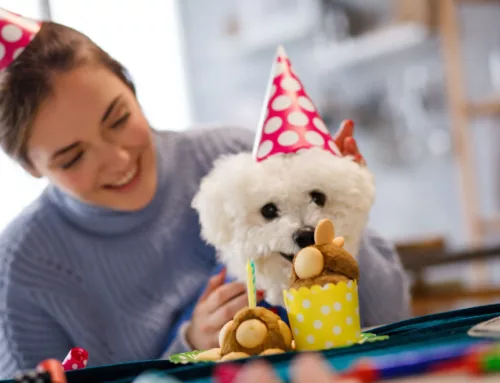Dogs are frequently said to be man’s best friend. And it’s true! Pet owners will spend so much of their time with their pets, it’s more like a member of the family than just a friend. While dogs are seen as the most common example, man has made friends with tons of animals over the years with people keeping dogs, cats, rabbits, fish, hamsters, lizards, snakes and more in their homes. Pets are so popular it is estimated that over half the households in the country have some kind of furry or scaley companion in their life.
And while it may seem like you are taking care of your pet, your pet is actually taking care of you at the same time. Here is more on how animals can actually help humans.
What Having A Pet Can Do For You
Nothing compares to the feeling of getting home from a long day at work and your pet is waiting for you. Whether they come galloping to meet you at the door, raise their head from their sleeping spot or are scratching at their cage, it just feels great to be loved. And this is not just a feeling that we assume happens, it’s actually backed by scientific research.
Interacting with animals is shown to decrease the levels of cortisol and lower your blood pressure. Cortisol is a stress-related hormone that is used in your flight or fight response. Hormones coordinate different functions in your body and cortisol plays a big role in stress response, blood pressure, blood sugar and suppressing inflammation.
It is widely known as the stress hormone, so it is important to keep it as low as possible to stop acute, chronic and traumatic stress. This is because in stressful situations cortisol is released which will keep you on high alert and overall more stressed both physically and mentally.
Getting quality sleep and exercising regularly are the typical ways to reduce your cortisol levels, but interacting with animals is another key way to make yourself feel less stressed and combat the effects of cortisol in your system. It doesn’t even have to be a major interaction, even watching fish swim around can result in a feeling of calm for a person. It’s more about what pet fits with what owner, and the feeling that it will bring them.
Having an animal can also help you grow as a person. If you are not used to taking responsibility for anyone but yourself, it is a great way to get out of your comfort zone and manage new responsibilities. If you are thinking of having a child one day, a pet is an ideal method of getting a bit of experience taking care of something else, which will overall help you in the long run with your own children.
Assistance Animals
An assistance animal is an animal that is trained to aid or assist an individual with a disability. More often than not this animal is a dog, due to the way they can be trained and utilised in everyday life. Here are how different types of assistance animals can help.
Guide Dog
A big way in which animals can help humans is by assisting impaired people. Guide dogs are a type of assistance dog that are trained to lead blind or visually impaired people through life. While they are not the sole way a person navigates, they are a big help in navigating obstacles such as other pedestrians or obstacles in paths.
While any dog could technically be a guide dog, a few breeds are used more often than others for how easy they are to train and their temperament. The most popular breed used globally is the Labrador Retriever, but Golden Retrievers, Labradors, Poodles and German Shepherds are also commonly used.
Hearing Dogs
Hearing dogs are specifically trained to assist people who are deaf or hard of hearing. They will do this by drawing attention to important sounds that their handler may be missing, such as the telephone, smoke alarm or doorbell. These dogs are trained to react to these sounds and then physically alert their handler to the source. Some popular breeds to be used as hearing dogs include golden retrievers, cockapoos, cocker spaniels, poodles and labrador retrievers.
Monkeys & Horses
Two more odd service animals that you might not think of are monkeys and horses. Helper monkeys are trained to help those with conditions which have made them lose mobile function. They are trained for multiple years and can then help with a surprising amount of tasks, including microwaving food, washing their owner and turning pages in a book.
Miniature horses are used as guide animals for the blind or visually impaired. They can also pull wheelchairs if needed. They are often used when people have phobias or allergies to dogs, and because they have a longer lifespan than a dog, so can serve a person for most of their life.
Emotional Support Animal
An emotional support animal is an animal that will provide relief to individuals who are suffering from a psychiatric disability. While some other assistance animals are solely dogs, an emotional support animal can be anything. Dogs, cats and rabbits are common examples but it can truly be any animal that provides support, companionship, affection or aid to a person.
An emotional support animal does not require any special training other than the standard amount you might expect from an animal. Animals that will not make a good emotional support animal are those who represent a threat to the health and safety of the person they are meant to support.
Emotional support animals can help in a vast number of ways. A common reason for getting one is to combat loneliness. If somebody is living alone, a support animal can make a world of difference, making them feel less isolated and lonely. This can help people who have lost a partner, those recovering from surgery or their child going to university and leaving them by themselves
Animals are very in tune with people’s emotions, so can be great as a way to support them through hard times. Dogs have even been known to recognise when somebody is struggling or upset and then will go to sit with them and show affection.
Animal-Assisted Therapy
Animal-assisted therapy is an alternative type of therapy that involves animals in the treatment. Animals are used in therapy as they typically will help to improve a patient’s social, emotional or cognitive function and many positive results have occurred from using animals in therapy.
As mentioned previously, animals can have a positive effect on health and improve the mood of a person. These beliefs predate a lot of medical science confirmation, with the earliest reported use of animal-assisted therapy being in the late 18th century. Patients were allowed to wander the grounds of the York Retreat, where a small population of domesticated animals lived.
A bunch of different animals are used in animal-assisted therapy. One of the most popular is canine-assisted therapy. Well-trained dogs act as a source of comfort, using their welcoming demeanour and body contact. A surprising one is pig therapy, which has been known to help people with conditions such as autism or anxiety. Horses, cats and even dolphins have also been used as therapy animals!
Stay Healthy
While this isn’t the case with all animals, having a pet frequently enables a person to be more healthy and get out of the house more. Animals such as dogs will typically need walking multiple times a day, so by getting a dog you will suddenly be exercising a lot more regularly than you might’ve done in the past.
Classroom Pets
Classroom pets have been shown to help children grow and develop. It teaches them responsibility as they lend a hand in caring for a living creature. It can help in a number of ways, such as decreasing anxiety, helping with academic development and even improving attendance. Children with conditions like ADHD and autism can benefit from a classroom pet as they can help focus their attention. Overall classroom pets can decrease the need to discipline students, have improved social skills and increased self-esteem.
Bay Vets – Your Trusted Veterinary Surgery
Bay Vets is a proudly independent veterinary practice that is able to provide tailored healthcare for your pet. So while they take care of you, we can take care of them. We are made up of a passionate and knowledgeable team who are on hand to handle all aspects of your pet care, from everyday advice to emergency help.
From our four surgeries, we’re able to offer help in a range of locations including Lancaster, Morecambe, Milnthorpe and Caton. Our website has plenty of information that could help you out, such as poison guides and plenty of blogs with information on how to care for your pet.
If you’d like to find out more about how we can help you, contact us today.





